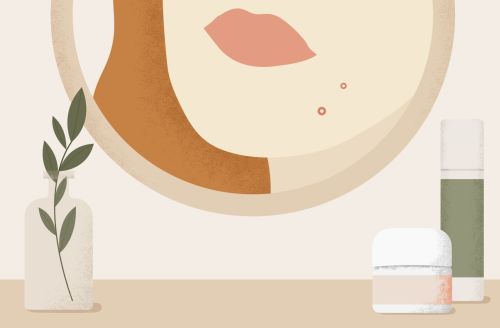Bless up that the conversations surrounding ‘good’ and ‘bad’ skin are finally shifting
What is healthy skin? Derms weigh in on why the idea of "good" versus "bad" skin is totally outdated, and why we need to change the way we talk about it.

Cleopatra famously bathed in milk to make her complexion more beautiful, so it’s safe to say that for centuries, the skin-care industry (and I guess in Cleopatra’s case, the dairy industry) has operated under the notion that we should all be striving for “good skin.” That translates to a complexion that’s free of pimples, blemishes, and other “imperfections.” By contrast, “bad skin”—one that has any combo of those things—should be quickly remedied with a purchase at your nearest skin-care shop.
“The absence of acne often suffices as ‘good skin,’ when you can actually have damage below the surface that will appear years later,” says board-certified dermatologist Dennis Gross, MD. That pretty much means the way that we’ve described complexions for years has been flat-out wrong. To help get a better picture of why it’s time to stop with the skin shaming, we talked to dermatologists and industry vets. Keep scrolling to hear what they had to say.
Having acne is more than skin deep
It’s some kind of cruel joke that, though acne is largely physically symptomatic skin condition, most of its ramifications are mental ones. A 2018 study found that acne can have a major impact on mental health, and another report found that those who had acne were six percent more likely to develop major depression than those who didn’t. There’s also a significant amount of research showing that acne has a direct correlation to low self-esteem.
This Parisian Skincare Brand Is Launching in the United States for the First Time—Here’s What a Derm Wants You to Know

We’re Calling It: Cleansing Balms Are the Face Wash of the Future—Here Are 3 to Add to Your Cart

This Is the One Product That Scarlett Johansson Always Keeps in Her Purse and on Her Bedside Table

The way that we’ve always talked about it hasn’t exactly helped. Acne, in particular, has been vilified as a behavioral flaw that results from things like eating sugar or not being diligent enough with your skin-care routine. Both of those are total B.S., by the way. “You could have perfect hygiene, perfect hormones, and be perfectly healthy inside and still have acne,” says board-certified dermatologist Ellen Marmur, MD. “Most people with acne have normal sugar, it’s not because of sugar or glycation or diet, it’s really often very environmental.”
Yet, the chase for clear-complected glory has sent the acne market soaring from $4.92 billion in 2016 to an expected $7.35 billion in 2025, and the rush of offerings has created an accessibility problem that further widens the gap for who can have stereotypically “good” skin. For example, the most effective treatment—retinoids—only became available over the counter in 2016, so before that, you had to have access to a dermatologist. That’s a privilege that isn’t necessarily an option for everyone. FWIW: The current wait time to get an appointment with a derm in certain parts of the country is 56 days, which means that if you get an intense breakout, you have to wait for way longer than it takes your skin cells to turn over (28 days) to see a pro.
We can change this conversation
Luckily, the skin-care industry is climbing faster than ever, and as we called out in our 2020 Trends report, cost-effective options are becoming more commonplace (just look at explosion of The Ordinary and The Inkey List). As this set continues to grow, so too, do more representative images of all skin types. In large part, this is thanks to the rise in user-generated content on Instagram and other social platforms. Where acne used to be Photoshopped away, now many people (though certainly not 100 percent, just yet) are embracing it as part of the #skinpositivity movement.
Brands took notice of the hunger for reality, and over the last few years major players like CVS, Dove, and SK-II have committed to stop retouching their models’ skin. “In the skin category, words like ‘blemish’ or “imperfection” have always been commonplace—but those are words we don’t use because they’re really discouraging and really disheartening,” says Julie Schott, beauty industry vet and co-founder of acne-positive skin-care brand, Starface, which launched in 2019.
Normalizing acne, the way the industry has started to do, helps give people with any type of skin confidence. Considering how closely the condition has been linked to mental health, that’s major step in the right direction. On Reddit (the skin-care mecca of the Internet), people have gone even further than just accepting their acne, but actually celebrating it as a positive. And as we all move more in that direction, we’re happy to see the term “bad skin” go by the way of Cleopatra’s milk baths and become ancient history.
Here’s how one of our beauty editors made peace with her own acne. And skin isn’t the only element of the beauty world that’s tied to our mental health: here’s why hair and identity are so intrinsically linked.
Sign Up for Our Daily Newsletter
Get all the latest in wellness, trends, food, fitness, beauty, and more delivered right to your inbox.
Got it, you've been added to our email list.







